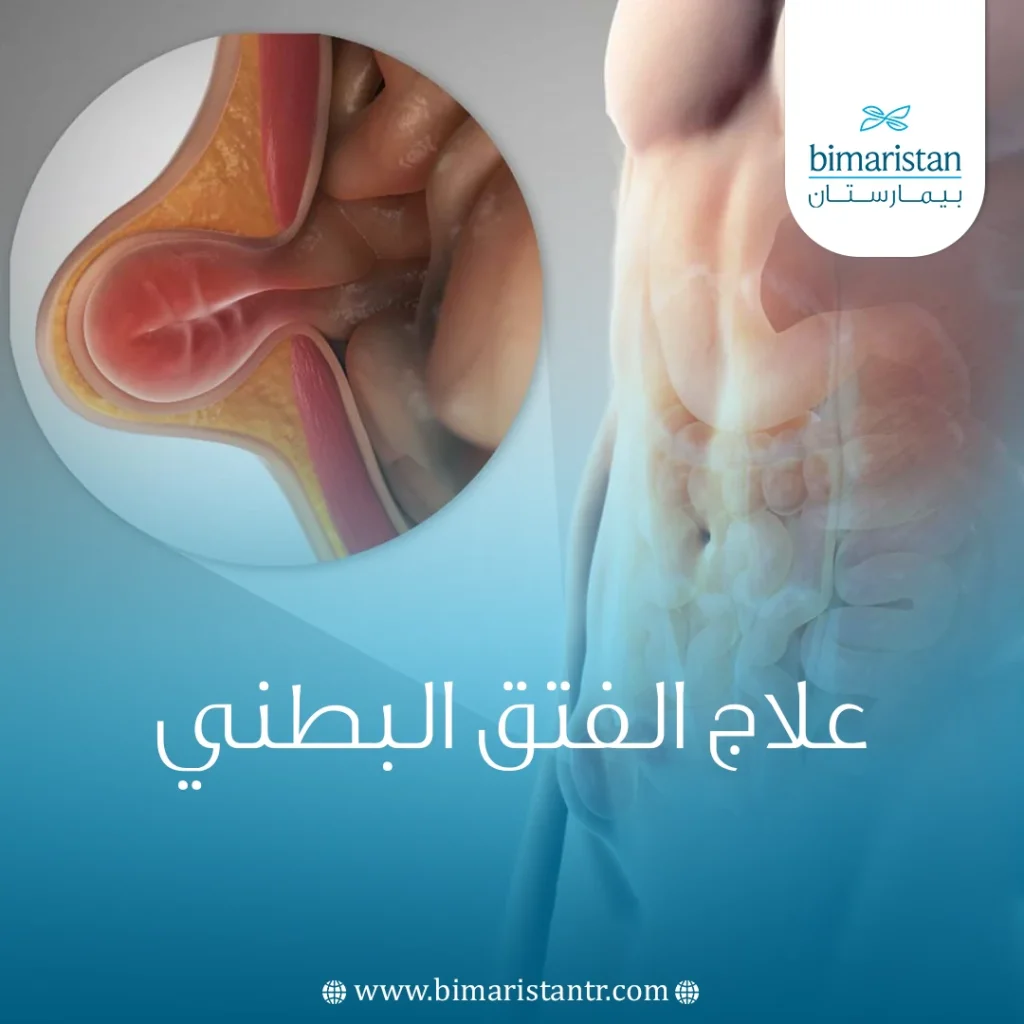يحدث الفتق البطني في جدار البطن. حيث تشمل الأعراض ألم وانتفاخ في البطن، يتم علاج الفتق البطني في تركيا بالجراحة، حيث يشمل ذلك الجراحة المفتوحة أوالمنظار أوالروبوت.
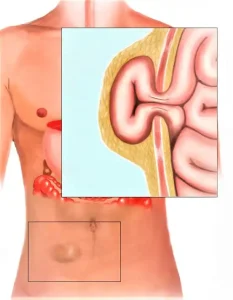
ما هو الفتق البطني abdominal hernia ؟
يحدث الفتق عندما يكون هناك ثقب في عضلات جدار البطن، مما يسمح بدفع حلقة من نسيج الأمعاء أو البطن عبر طبقة العضلات.
الفتق البطني هو فتق يحدث في أي مكان على طول خط الوسط (المركز العمودي) لجدار البطن بالإضافة لأنه من الممكن أن يتشكل في أماكن آخرى.
هناك ثلاثة أنواع من الفتق البطني:
النوع الأول: الفتق الشرسوفي (منطقة المعدة):
يحدث في أي مكان من أسفل عظم القص مباشرة إلى السرة (السرة). يظهر هذا النوع من الفتق في كل من الرجال والنساء.
النوع الثاني: فتق السرة:
يحدث في منطقة السرة.
النوع الثالت: الفتق الجراحي:
يتطور في موقع الجراحة السابقة.
حوالي ثلث المرضى الذين خضعوا لجراحة في البطن سيصابون بفتق جراحي في موقع ندبهم.
يمكن أن يحدث هذا النوع من الفتق في أي وقت يمتد بين عدة شهور إلى سنوات بعد جراحة البطن.
أعراض الفتق البطني وأسبابه
ما هي أسباب وعوامل الخطر لتطوير فتق بطني؟
هناك العديد من الأسباب منها:
- ضعف في موقع الشق الجراحي لجراحة سابقة في البطن (والذي قد ينجم عن عدوى في موقع الجراحة أو فشل في الإصلاح الجراحي / أو عندوضع الشبكة).
- ضعف في منطقة من جدار البطن كانت موجودة عند الولادة.
- ضعف في جدار البطن بسبب الظروف التي تضغط على جدار البطن (تماثل الأسباب التي تكون في الفتق الإربي). وتشمل هذه:
- زيادة الوزن
- نوبات سعال متكررة
- قيء شديد
- الحمل
- تاريخ رفع أو دفع أشياء ثقيلة
- إجهاد اثناء التبرز / التبول
- إصابات في منطقة الأمعاء
- أمراض الرئة (مرض الانسداد الرئوي المزمن وانتفاخ الرئة؛ صعوبة التنفس يؤدي إلى إجهاد جدار البطن)
- البروستاتا (تضخم غدة البروستاتا، مما يسبب الإجهاد أثناء التبول عند الرجال الأكبر سناً)
- التقدم في السن (فقدان عام لمرونة جدار البطن)
ما هي علامات وأعراض الفتق البطني؟
لا يشعر بعض المرضى بأي انزعاج في المراحل المبكرة من تكوين الفتق البطني.
غالبًا ما تكون العلامة الأولى عبارة عن انتفاخ مرئي تحت الجلد في البطن أو منطقة حساسة عند اللمس. قد يتسطح الانتفاخ عند الاستلقاء أو الضغط عليه.
يتسبب الفتق البطني في زيادة مستوى الألم عند:
- رفع الأشياء الثقيلة.
- الجلوس أو الوقوف لفترات طويلة من الزمن.
يمكن أن يحدث ألم شديد في البطن إذا انتفخ جزء من الأمعاء عبر جدار البطن وانحصر في الفتحة.
إذا حدث هذا، فإن الجزء المحاصر من الأمعاء يصبح مخنوقًا، حيث يفقد التغذية الدموية ويبدأ بالتموت. تعتبر هذه حالة طبية طارئة تتطلب رعاية فورية.
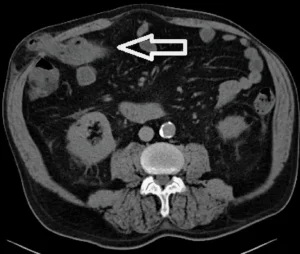
التشخيص والاختبارات للفتق البطني في تركيا
كيف يتم تشخيص الفتق البطني؟
سيراجع طبيبك تاريخك الطبي والجراحي. سيقوم أيضًا بإجراء فحص جسدي لمنطقة البطن حيث قد يحدث فتق بطني.
قد يطلب طبيبك بعد ذلك اختبارات تصوير للبطن للبحث عن علامات الفتق البطني.
قد تشمل هذه الاختبارات التصوير بالموجات فوق الصوتية أو التصوير المقطعي المحوسب (CT) أو دراسة التصوير بالرنين المغناطيسي (MRI).
الإدارة والعلاج في تركيا
كيف يتم علاج الفتق البطني؟
لا يزول الفتق البطني أو يتحسن من تلقاء نفسه ويتطلب جراحة لإصلاحه. في الواقع، بدون علاج، يمكن أن يتضخم الفتق البطني ويزداد سوءًا مع مرور الوقت.
يمكن أن يصبح من الصعب إصلاح الفتق غير المعالج ويمكن أن يؤدي إلى مضاعفات خطيرة، مثل خنق جزء من الأمعاء.
حيث يعتبر من الخطأ الاعتقاد بإمكانية علاج الفتق بدون جراحة.
الهدف من جراحة الفتق البطني هو إصلاح الثقب / العيب في جدار البطن حتى لا تخرج الأمعاء وأنسجة البطن الأخرى عبر الجدار مرة أخرى.
غالبًا ما تعيد الجراحة تناسق وشكل جدار البطن عن طريق إصلاح الفتحة وإعادة العضلات إلى وضعها الطبيعي.
جراحة الفتق البطني بالمنظار في تركيا
ما هي مزايا التنظير البطني لإصلاح الفتق؟
قد تختلف النتائج حسب نوع الإجراء والحالة العامة لكل مريض. قد تشمل المزايا الشائعة لـ علاج الفتق البطني بالمنظار ما يلي:
- آلام أقل بعد الجراحة
- تقصير الإقامة في المستشفى
- عودة أسرع إلى النظام الغذائي العادي
- عودة أسرع إلى النشاط الطبيعي
- نسبة أقل من التهابات الجروح
هل أنت مرشح لإصلاح الفتق بالمنظار؟
يمكن للجراح تحديد ما إذا كان إصلاح الفتق البطني بالمنظار مناسبًا لك فقط بعد إجراء فحص شامل.
قد لا يكون الإجراء هو الأفضل لبعض المرضى الذين خضعوا لجراحة واسعة في البطن سابقًا، أو الفتق الموجود في أماكن غير عادية أو يصعب الاقتراب منها، أو الحالات الطبية الأساسية. تأكد من استشارة طبيبك حول حالتك الخاصة.
ما هي الاستعدادات المطلوبة لإصلاح الفتق البطني بالمنظار؟
- يتم إجراء معظم عمليات الفتق البسيطة في العيادة الخارجية، وبالتالي من المحتمل أن تعود إلى المنزل في نفس اليوم أو في اليوم التالي لإجراء العملية.
- قد تتطلب عمليات الفتق الأكثر تعقيدًا أو تكرارًا قضاء عدة أيام في المستشفى بعد الجراحة.
- التحضير قبل الجراحة يشمل تحليل الدم والتقييم الطبي والأشعة السينية للصدر وتخطيط القلب حسب عمرك وحالتك الطبية.
- بعد أن يراجع الجراح معك المخاطر والفوائد المحتملة للعملية، ستحتاج إلى تقديم موافقة كتابية على الجراحة.
- يوصى بالاستحمام في الليلة السابقة أو صباح يوم العملية.
- طلب الجراح أن تقوم بتفريغ القولون تمامًا وتطهير أمعائك قبل الجراحة.
عادة، يجب أن تشرب محلول تنظيف خاص. قد يُطلب منك شرب سوائل صافية، فقط، ليوم واحد أو عدة أيام قبل العملية. - بعد منتصف الليل في الليلة التي تسبق العملية، يجب ألا تأكل أو تشرب أي شيء باستثناء الأدوية التي أخبرك الجراح أنه من المسموح تناولها مع رشفة من الماء صباح يوم الجراحة.
- يجب إيقاف الأدوية مثل مميعات الدم والأدوية المضادة للالتهابات (أدوية التهاب المفاصل) وفيتامين هـ مؤقتًا لعدة أيام إلى أسبوع قبل الجراحة.
- يجب عدم استخدام أدوية التخسيس أو نبتة “العرن المثقوب” لمدة أسبوعين قبل الجراحة.
- يوصى بشدة وأحيانًا يتطلب منك التوقف عن التدخين قبل الجراحة
- رتِّب للحصول على أي مساعدة قد تحتاجها للعودة إلى المنزل بعد العملية.
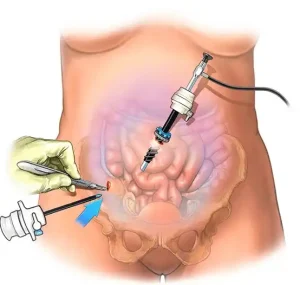
كيف يتم إجراء تنظير البطن لإصلاح الفتق؟
هناك عدد قليل من الخيارات المتاحة لمريض فتق بطني.
- يُوصَف أحيانًا استخدام حزام الفتق البطني، ولكنه في معظم الأحيان يكون غير فعال.
- لا يزول الفتق البطني من تلقاء نفسه وقد يتضخم مع مرور الوقت.
- الجراحة هي العلاج المفضل ويتم إجراؤها بإحدى طريقتين:
- الطريقة التقليدية تتم من خلال إجراء شق في جدار البطن. يتم إجراء شق في الجلد والطبقة دهنية التي تحته، في البطن. قد يختار الجراح خياطة أنسجتك الطبيعية معًا مرة أخرى، ولكن في كثير من الأحيان، يتطلب ذلك وضع شبكة (الشاشية) في أو على جدار البطن لإغلاق الصفاق.
يتم إجراء هذه التقنية غالبًا تحت التخدير العام ولكن في حالات معينة يمكن إجراؤها تحت التخدير الموضعي مع أو بدون التخدير النخاعي. سيساعدك الجراح في اختيار التخدير الأفضل لك. - الطريقة الثانية هي إصلاح الفتق البطني بالمنظار.
في هذا النهج، يتم إدخال منظار البطن (تلسكوب صغير مزود بكاميرا تليفزيونية) من خلال فتحة صغيرة (أنبوب مجوف صغير). يسمح منظار البطن وكاميرا التلفزيون للجراح بمشاهدة الفتق من الداخل.
ستكون هناك حاجة إلى شقوق صغيرة أخرى لوضع أدوات أخرى لإزالة أي نسيج ندبي وإدخال الشبكة الجراحية في البطن.
يتم تثبيت هذه الشبكة أو الشاشية تحت المنطقة المصابة من الفتق على الأنسجة القوية لجدار البطن.
يتم تثبيتها في مكانها بمسامير جراحية خاصة وفي كثير من الحالات، خيوط جراحية.
عادة، من الضروري إجراء ثلاثة أو أربعة شقوق من 1/4 بوصة إلى 1/2 بوصة.
يتم وضع الغرز، التي تمر عبر سماكة جدار البطن بالكامل، من خلال شقوق أصغر حول محيط الشبكة. تجرى هذه العملية عادة تحت تأثير التخدير العام.
ما الذي يجب أن أتوقعه في يوم جراحة إصلاح الفتق؟
- عادة ما تصل إلى المستشفى في صباح يوم العملية.
- عادةً ما يقوم أحد أفراد الطاقم الطبي المؤهل بوضع إبرة صغيرة أو قسطرة في وريدك لتوزيع الدواء أثناء الجراحة. في كثير من الأحيان يمكن إعطاء الأدوية قبل الجراحة، مثل المضادات الحيوية.
- سوف يستمر التخدير الخاص بك أثناء الجراحة وحتى عدة ساعات بعد الجراحة.
- بعد العملية، سيتم نقلك إلى غرفة الإنعاش وتبقى هناك حتى تستيقظ تمامًا.
- يعود العديد من المرضى إلى منازلهم في نفس يوم الجراحة، بينما قد يحتاج آخرون إلى الدخول ليوم واحد أو أكثر بعد الجراحة. سيتم تحديد الحاجة للبقاء في المستشفى وفقًا لمدى الإجراء الجراحي وصحتك العامة.
ماذا يحدث إذا تعذر إجراء أو استكمال إصلاح الفتق البطني بطريقة التنظير البطني؟
في عدد قليل من المرضى، لا يمكن إجراء طريقة التنظير البطني. العوامل التي قد تزيد من إمكانية الاختيار أو التحويل إلى الإجراء “المفتوح” قد تشمل السمنة، تاريخ طويل من جراحة سابقة في البطن تسبب في تندب كثيف، وعدم القدرة على تصور الأعضاء أو مشاكل النزيف أثناء العملية.
قرار إجراء العملية المفتوحة هو قرار يتخذه الجراح إما قبل أو أثناء العملية الفعلية.
عندما يشعر الجراح أنه من الأكثر أمانًا تحويل الإجراء بالمنظار إلى إجراء مفتوح، فإن هذا ليس من المضاعفات، ولكنه قرار جراحي سليم. يعتمد قرار التحول إلى إجراء مفتوح بشكل صارم على سلامة المريض.
مرحلة مابعد الجراحة
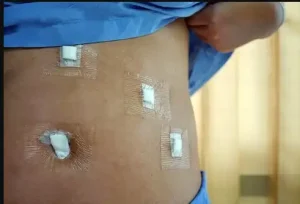
ما الذي يجب أن أتوقعه بعد جراحة الفتق البطني؟
- يتم تشجيع المرضى على ممارسة نشاط خفيف أثناء تواجدهم في المنزل بعد الجراحة. سيحدد الجراح مدى النشاط، بما في ذلك الرفع والأشكال الأخرى من المجهود البدني. اتبع نصيحة الجراح بعناية. عادة ما يكون الانزعاج بعد الجراحة خفيفًا إلى متوسط. في كثير من الأحيان، سيحتاج المرضى إلى مسكنات للألم.
- إذا بدأت تعاني من الحمى، أو القشعريرة، أو القيء، أو عدم القدرة على التبول، أو تعاني من تصريف من شقوقك، يجب عليك الاتصال بالطبيب الجراح على الفور.
- إذا كنت تعاني من وجع طويل الأمد ولم تحصل على راحة من مسكنات الألم الموصوفة لك، فيجب عليك إخبار الجراح.
- يستطيع معظم المرضى العودة إلى أنشطتهم الطبيعية في فترة زمنية قصيرة. تشمل هذه الأنشطة الاستحمام والقيادة، وصعود الدرج، والعمل، والجماع.
- من حين لآخر، يصاب المرضى بكتلة أو بعض التورم في المنطقة التي كان فيها فتقهم. غالبًا ما يكون هذا بسبب تجمع السوائل في المساحة السابقة للفتق. غالبًا ما يختفي هذا من تلقاء نفسه بمرور الوقت. إذا لم يكن الأمر كذلك، فقد يقوم الجراح بشفطها بإبرة في العيادة.
- يجب أن تسأل طبيبك عندما تحتاج إلى تحديد موعد للمتابعة. عادة، يقوم المرضى بجدولة مواعيد المتابعة في غضون 2-3 أسابيع بعد العملية.
مضاعفات جراحة الفتق البطني
ما هي المضاعفات التي يمكن أن تحدث؟
- على الرغم من أن هذه العملية تعتبر آمنة، فقد تحدث مضاعفات لأنها قد تحدث مع أي عملية، ويجب عليك استشارة طبيبك حول حالتك الخاصة.
قد تشمل المضاعفات أثناء العملية ردود فعل سلبية للتخدير العام أو النزيف أو إصابة الأمعاء أو أعضاء البطن الأخرى.
تشمل المشاكل المحتملة الأخرى الالتهاب الرئوي أو جلطات الدم أو مشاكل القلب.
إذا حدثت عدوى في الشبكة، فقد تحتاج إلى إزالتها أو استبدالها. أيضًا، في أي وقت يتم فيه إصلاح الفتق، فإنه من الممكن أن ينكس. - معدل التكرار على المدى الطويل غير معروف حتى الآن. تشير النتائج الأولية إلى أنها جيدة مثل النهج المفتوح.
سيساعدك الجراح في تحديد ما إذا كانت مخاطر إصلاح الفتق البطني بالمنظار أقل من مخاطر ترك الحالة دون علاج. - من المهم أن تتذكر أنه قبل الخضوع لأي نوع من الجراحة، سواء كانت تنظيرية أو تقليدية، يجب أن تسأل جراحك عن تدريبه وخبرته.
متى تتصل بطبيبك بعد علاج الفتق البطني
تأكد من الاتصال بجراحك إذا حصل أي مما يلي:
- الحمى المستمرة فوق 101 فهرنهايت (39 درجة مئوية)
- النزيف
- زيادة انتفاخ البطن أو الألم
- الألم الذي لا يتم تخفيفه عن طريق الأدوية الخاصة بك
- الغثيان أو القيء المستمر
- قشعريرة
- السعال المستمر أو ضيق التنفس
- احمرار حول شقوقك

